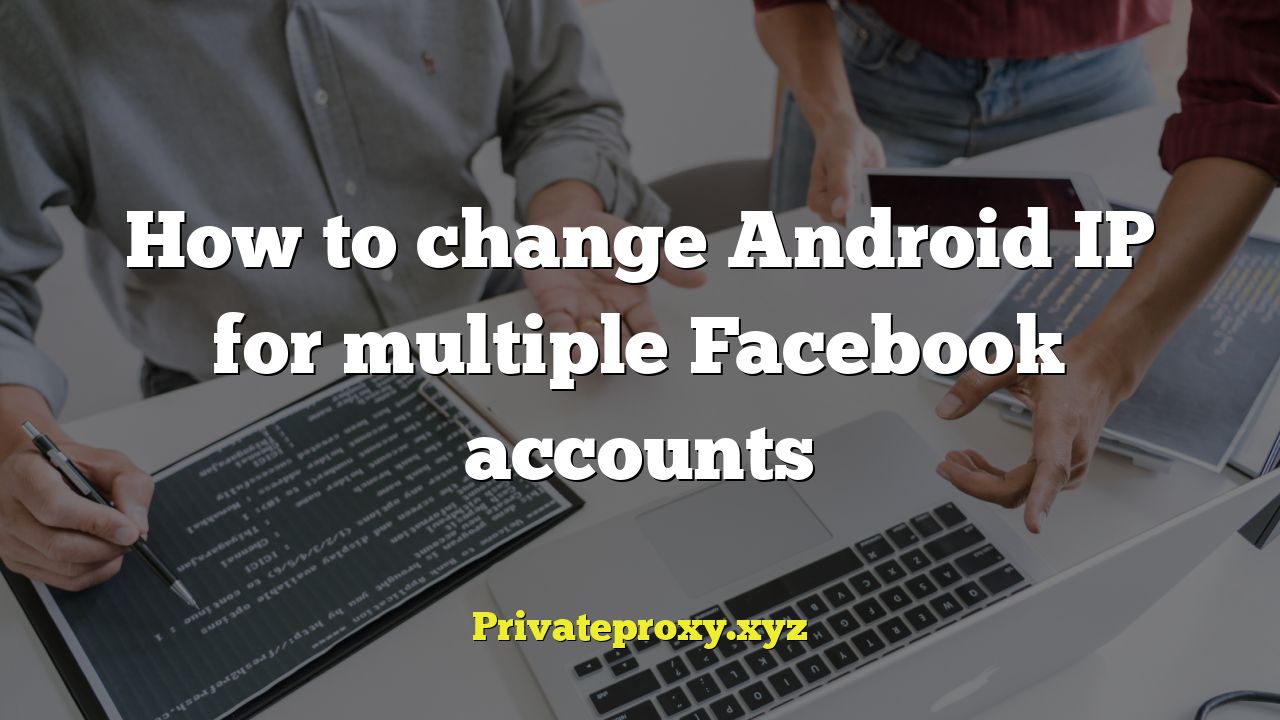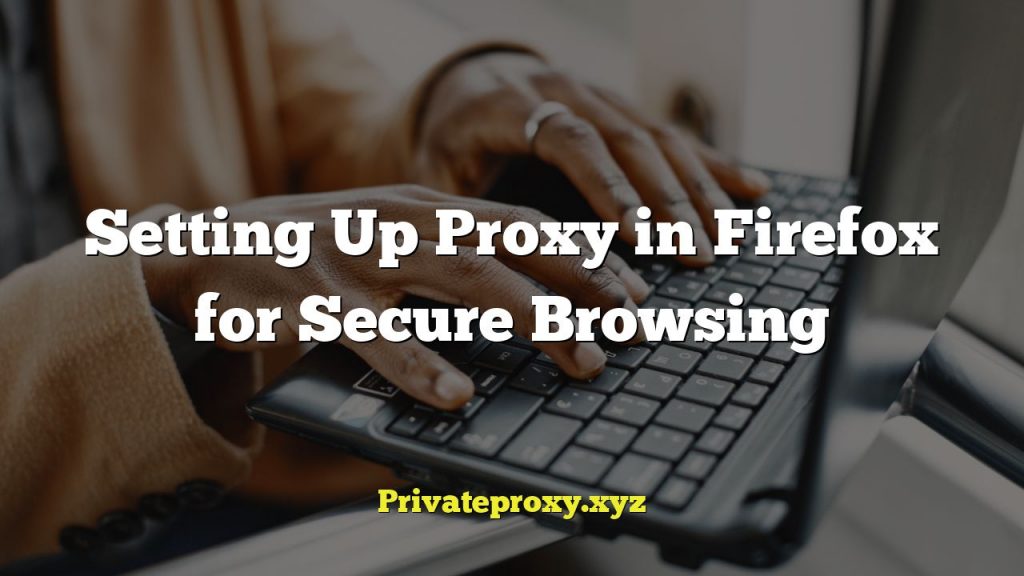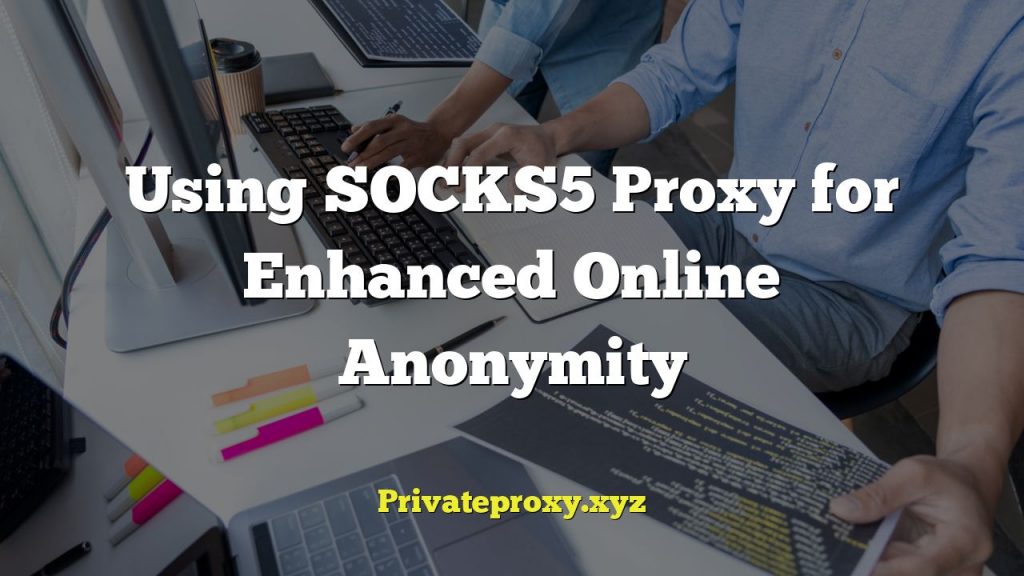
Understanding the Need for IP Address Changes with Multiple Facebook Accounts
Managing multiple Facebook accounts, whether for marketing, research, or personal reasons, can present challenges, especially when it comes to avoiding detection and account suspensions. Facebook’s algorithms are designed to identify and flag suspicious activity, including multiple accounts originating from the same IP address. Changing your Android IP address for each account can significantly mitigate this risk, making your activities appear more organic and less automated.
Before diving into the methods, it’s crucial to understand why this is important. Facebook, like many social media platforms, uses IP addresses as one factor to identify users and their behaviors. Repeated logins from the same IP address across numerous accounts can raise red flags, leading to account limitations or even permanent bans. By varying your IP address, you effectively create a more diverse footprint, making it harder for Facebook to link your accounts together.
Methods for Changing Your Android IP Address
There are several approaches to changing your Android IP address. Each method has its own pros and cons in terms of cost, security, and ease of use. We’ll explore the most common and effective techniques below:
Using a Virtual Private Network (VPN)
A VPN is one of the most popular and straightforward methods for changing your IP address on Android. VPNs work by routing your internet traffic through a server in a different location, effectively masking your real IP address and replacing it with the IP address of the VPN server.
To use a VPN:
- Choose a reputable VPN provider with a wide range of server locations.
- Download and install the VPN app from the Google Play Store.
- Create an account or sign in if you already have one.
- Connect to a server location that you want to use.
- Verify your IP address has changed using an online IP lookup tool.
It’s important to choose a VPN provider carefully. Look for providers with strong encryption, a no-logs policy, and a good reputation for privacy. Free VPNs may seem tempting, but they often come with limitations, such as slower speeds, data caps, and potential security risks. Consider paid VPNs for more reliable and secure service.
Utilizing Proxy Servers
Proxy servers function similarly to VPNs, acting as intermediaries between your device and the internet. However, proxies typically only route traffic for specific applications, while VPNs encrypt and route all internet traffic on your device. This can make proxies a lighter-weight option, but also less secure.
To use a proxy server:
- Find a reliable proxy server. Many websites list free and paid proxy servers.
- Configure your Android device to use the proxy server. This usually involves going to your Wi-Fi settings, selecting your network, and modifying the proxy settings. (Note: This may vary depending on your Android version.)
- Set the proxy settings to manual and enter the proxy server’s address and port number.
- Save the changes and test your connection to ensure it’s working correctly.
When choosing a proxy server, consider the type of proxy (HTTP, HTTPS, or SOCKS), its location, and its speed. Public proxy servers can be unreliable and may not offer the same level of security as VPNs. Private or dedicated proxy servers are generally more reliable and secure, but they come at a cost.
Employing Mobile Data and Airplane Mode
A simple and free method is to switch between your Wi-Fi connection and your mobile data connection. Each connection typically has a different IP address. You can also cycle Airplane Mode to force a new IP address assignment from your mobile carrier.
To use mobile data and airplane mode:
- Disable your Wi-Fi connection.
- Enable your mobile data connection.
- To further change the IP address, enable Airplane Mode for a few seconds, then disable it. This forces your device to reconnect to the mobile network and obtain a new IP address.
- Verify your IP address has changed using an online IP lookup tool.
This method is less reliable than VPNs or proxies, as your mobile carrier may assign you the same IP address repeatedly. However, it’s a quick and easy option for occasional IP address changes.
Best Practices for Managing Multiple Facebook Accounts
Changing your IP address is just one piece of the puzzle when it comes to managing multiple Facebook accounts effectively. To minimize the risk of detection and account suspensions, consider the following best practices:
Vary Your Account Activity
Avoid performing the same actions on all of your accounts at the same time. Spread out your posting, liking, and commenting activities to make your accounts appear more natural.
Use Different User Agents
A user agent is a string of text that identifies the type of device and browser you’re using to access the internet. Using different user agents for each account can further diversify your digital footprint.
Maintain Unique Account Profiles
Each Facebook account should have a unique profile picture, name, bio, and other personal information. Avoid using the same information across multiple accounts.
Warm-Up New Accounts
If you’re creating new Facebook accounts, don’t start using them aggressively right away. Gradually build up their activity over time to make them appear more legitimate.
Use Different Email Addresses and Phone Numbers
Register each account with a unique email address and, if possible, a unique phone number. Avoid using the same contact information across multiple accounts.
Choosing the Right Method for Your Needs
The best method for changing your Android IP address for multiple Facebook accounts depends on your specific needs and resources. If you require a high level of security and reliability, a paid VPN is the best option. If you’re looking for a free and quick solution, switching between Wi-Fi and mobile data may suffice. Proxy servers offer a middle ground between the two, but they can be less secure than VPNs.
Remember to combine IP address changes with other best practices for managing multiple Facebook accounts to minimize the risk of detection and account suspensions. By taking these precautions, you can effectively manage your accounts and achieve your desired goals without compromising your online safety or violating Facebook’s terms of service.
Advanced Techniques: Mobile Proxies and Residential Proxies
While VPNs and regular proxies are helpful, more sophisticated methods like mobile proxies and residential proxies offer even greater anonymity and reduce the risk of detection. These types of proxies use IP addresses that are assigned to real mobile devices or residential internet connections, making them appear more legitimate to Facebook’s algorithms.
Mobile Proxies: These proxies route your traffic through real mobile devices, making it look like you’re browsing from a smartphone or tablet. This can be particularly useful for tasks that are typically performed on mobile devices, such as using the Facebook mobile app.
Residential Proxies: These proxies use IP addresses that are assigned to residential internet connections, making it appear like you’re browsing from a home network. This can be more effective than using data center IP addresses, which are often associated with VPNs and proxy servers.
Both mobile proxies and residential proxies tend to be more expensive than regular proxies, but they offer a higher level of anonymity and are less likely to be blocked by Facebook.
Important Considerations and Potential Risks
While changing your IP address can help you manage multiple Facebook accounts more effectively, it’s important to be aware of the potential risks and legal considerations:
- Terms of Service Violations: Facebook’s terms of service may prohibit the use of multiple accounts or the use of techniques to circumvent their security measures. Violating these terms can result in account suspensions or bans.
- Security Risks: Using unreliable or untrusted VPNs or proxies can expose your data to security risks, such as malware, phishing attacks, and data breaches.
- Legal Implications: Depending on your location and the purpose of your activities, using multiple Facebook accounts may have legal implications. It’s important to understand the laws and regulations in your jurisdiction before engaging in such activities.
Always prioritize your online security and privacy. Choose reputable providers and follow best practices to minimize the risks associated with changing your IP address and managing multiple Facebook accounts. Use these techniques responsibly and ethically, and always respect the terms of service of the platforms you use.


